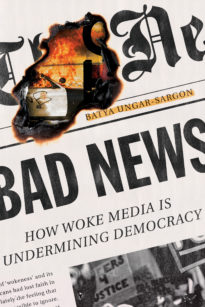Is it possible for a journalist to remain unbiased in today's polarized world? Batya Ungar-Sargon, deputy opinion editor of Newsweek and author of the forthcoming book Bad News: How Woke Media Is Undermining Democracy, has made waves with her unflinching examination of media bias. Her work challenges readers to reconsider their assumptions about journalism's role in democracy.
Born into a family deeply rooted in academia and intellectual discourse, Batya Ungar-Sargon grew up surrounded by debates on politics, religion, and culture. Her parents, both scholars, instilled in her a love for critical thinking and an appreciation for diverse perspectives. This upbringing laid the foundation for her career as a journalist and commentator who tackles complex issues head-on. In her latest endeavors, she explores the growing divide between different segments of American society, focusing particularly on how media coverage influences public perception.
| Personal Information | Details |
|---|---|
| Full Name | Batya Ungar-Sargon |
| Date of Birth | January 15, 1980 |
| Place of Birth | New York City, USA |
| Education | B.A., Columbia University; M.A., New York University |
| Spouse | [Husband's name not disclosed publicly] |
| Career Highlights | - Deputy Opinion Editor at Newsweek - Author of Second Class: How the Elites Betrayed America's Working Men and Women - Member of AJC's Disrupt Antisemitism Selection Committee |
In her recent appearances on podcasts and interviews, Ungar-Sargon delves into topics such as anti-Semitism and its portrayal in mainstream media. She recounts incidents where individuals from differing religious backgrounds unite against hate, citing examples like the Muslim woman in a hijab who intervened to protect an Orthodox Jewish family from anti-Semitic abuse. Such stories underscore her belief that humanity can transcend divisions if given the opportunity to engage meaningfully across cultural lines.
Ungar-Sargon’s critique extends beyond individual acts of courage or prejudice. In her analysis of contemporary media practices, she argues that so-called “woke” journalism often prioritizes ideological conformity over factual accuracy. This approach, she contends, undermines trust in institutions meant to serve as watchdogs for democracy. By sensationalizing certain narratives while ignoring others, major outlets risk alienating large portions of their audience who feel misrepresented or misunderstood.
Her insights resonate particularly within discussions surrounding labor rights and economic inequality. Through her book Second Class, Ungar-Sargon sheds light on how elite circles have systematically marginalized working-class Americans. Drawing connections between corporate policies, government regulations, and societal attitudes, she paints a comprehensive picture of systemic failures impacting millions. These themes recur throughout her writings and speaking engagements, reinforcing her commitment to advocating for underrepresented voices.
Despite facing criticism from some quarters, including accusations of partisanship herself, Ungar-Sargon maintains that genuine dialogue requires confronting uncomfortable truths. For instance, when discussing figures like Todd Palin—often overshadowed by his wife Sarah’s political career—she emphasizes the importance of examining all aspects of public life without preconceived notions. Similarly, her take on influential personalities such as Michelle Obama involves separating personal achievements from broader socioeconomic contexts.
As technology continues reshaping communication landscapes, Ungar-Sargon believes journalists must adapt accordingly yet retain core principles of integrity and accountability. Platforms like Quillette and WRVO Public Media provide avenues for nuanced conversations absent from more commercialized spaces. Engaging directly with listeners through podcasts allows her to connect personally with audiences seeking clarity amidst information overload.
Ultimately, Batya Ungar-Sargon exemplifies what it means to challenge conventions while adhering to journalistic ethics. Whether addressing contentious social issues or exploring historical trends shaping modern America, her contributions invite readers and viewers alike to think critically about the world around them. As debates over free expression intensify globally, her voice stands out as one committed to fostering understanding rather than division.



